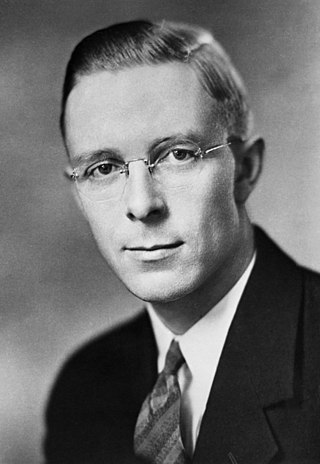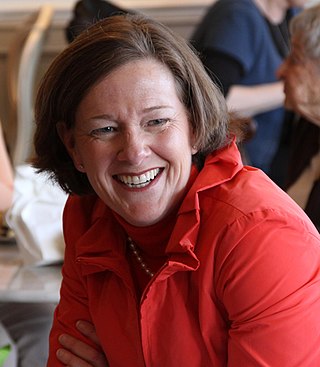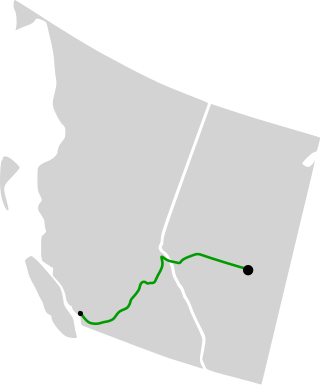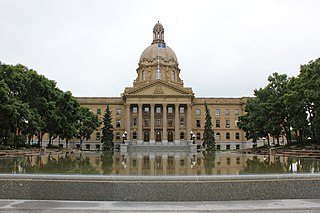
The 1967 Alberta general election was held on May 23, 1967, to elect members of the Legislative Assembly of Alberta to the 16th Alberta Legislature. The election was called after the 15th Alberta Legislature was prorogued on April 11, 1967, and dissolved on April 14, 1967.

The Alberta Gaming, Liquor and Cannabis Commission (AGLC) is an agency of the government of the Canadian province of Alberta, and regulates alcoholic beverages, recreational cannabis, and gaming-related activities. References to cannabis were added to AGLC's name and governing legislation as cannabis in Canada moved towards legalization in 2018. AGLC was created in 1996 as the Alberta Gaming and Liquor Commission by combining the responsibilities and operations of the Alberta Liquor Control Board (ALCB), Alberta Lotteries, the Alberta Gaming Commission, Alberta Lotteries and Gaming and the Gaming Control Branch. The current Chief Executive Officer as of 2020 is Kandice Machado.
The Alberta Union of Provincial Employees (AUPE) is a Canadian trade union operating solely in the province of Alberta. With approximately 95,000 members as of March 2019, it is Alberta's largest union. AUPE is primarily a public sector union, with members employed in government, health care, education, boards and agencies, municipalities, and occasionally private companies.

The Alberta Heritage Savings Trust Fund(HSTF) is a sovereign wealth fund established in 1976 by the Government of Alberta under then-Premier Peter Lougheed. The Heritage Savings Trust Fund was created with three objectives: "to save for the future, to strengthen or diversify the economy, and to improve the quality of life of Albertans." The operations of the Heritage Savings Trust Fund are subject to the Alberta Heritage Savings Trust Fund Act and with the goal of providing "prudent stewardship of the savings from Alberta's non-renewable resources by providing the greatest financial returns on those savings for current and future generations of Albertans." Between 1976 and 1983 the Government of Alberta deposited a portion of oil revenue into the fund. The Heritage Savings Trust Fund used oil revenues to invest for the long term in such areas as health care, education and research and as a way of ensuring that the development of non-renewable resources would be of long-term benefit to Alberta. The strategy and goals of the fund have changed through successive provincial governments which moved away from direct investments in Alberta to a diversified approach, which now includes stocks, bonds, real estate and other ventures.

Alison Merrilla Redford is a Canadian lawyer and former politician. She was the 14th premier of Alberta, having served in this capacity from October 7, 2011, to March 23, 2014. Redford was born in Kitimat, British Columbia and grew up all over Canada and overseas before settling in Calgary as a teenager.

Rachel Anne Notley is a Canadian politician who was the 17th premier of Alberta from 2015 to 2019, and has been the leader of the Opposition since 2019. She sits as the member of the Legislative Assembly (MLA) for Edmonton-Strathcona, She is the longest serving member of the legislature by consecutive time in office and is the leader of the Alberta New Democratic Party (NDP). The daughter of former Alberta NDP leader Grant Notley, she was a lawyer before entering politics; she focused on labour law, with a specialty in workers' compensation advocacy and workplace health and safety issues.

The 28th Alberta Legislative Assembly was in session from May 23, 2012, to April 7, 2015, with the membership of the assembly determined by the results of the 2012 Alberta general election held on April 23, 2012. The Legislature officially resumed on May 23, 2012, and continued until the third session was prorogued and dissolved on April 7, 2015, prior to the 2015 Alberta general election on May 5, 2015.

Artur Pawlowski is a Polish-Canadian evangelical street preacher and political activist. He is pastor of the Cave of Adullam congregation in Calgary and previously led the Kings Glory Fellowship (KGF). Pawlowski is also founder and pastor of Street Church Ministries (SCM), a group no longer recognized as a religious or charitable organization by the Canadian government.

The Trans Mountain Pipeline System, or simply the Trans Mountain Pipeline(TMPL), is a multiple product pipeline system that carries crude and refined products from Edmonton, Alberta, to the coast of British Columbia, Canada.

The Unistʼotʼen Camp is a protest camp and indigenous healing centre in northern British Columbia, Canada. It is located within the traditional territory of the Unist'otʼen clan of the Wetʼsuwetʼen First Nation peoples. Established after the proposal of several pipeline projects in the area, it is situated where several pipelines will pass, as a means to block their construction.

Rajan Sawhney is a Canadian politician from the United Conservative Party in Alberta. She was elected in the 2019 Alberta general election to represent the electoral district of Calgary-North East in the 30th Alberta Legislature. On April 30, 2019, she was appointed to be the Minister of Community & Social Services in the Executive Council of Alberta. On July 8, 2021, she was shuffled into the Minister of Transportation.

The 30th Alberta Legislative Assembly was constituted after the general election on April 16, 2019. The United Conservative Party (UCP), led by Jason Kenney, won a majority of seats and formed the government. The New Democrats, led by outgoing Premier Rachel Notley, won the second most seats and formed the official opposition. The premiership of Jason Kenney began on April 30, 2019, when Jason Kenney and his first cabinet were sworn in by Lieutenant Governor of Alberta, Lois Mitchell. On October 11, 2022, Kenney resigned, and Danielle Smith, the new leader of the UCP, was sworn in as premier by Lieutenant Governor Salma Lakhani. The 30th Legislature was dissolved on May 1, 2023, triggering a general election on May 29.

The premiership of Jason Kenney spanned from April 2019 until October 2022, when Jason Kenney and his cabinet were sworn in by Lieutenant Governor of Alberta, Lois Mitchell. Kenney was invited to form the 30th Alberta Legislature and became the 18th Premier of Alberta, following the 2019 Alberta general election where Kenney's United Conservative Party (UCP) won a majority of seats in the Alberta Legislature leading to the resignation of Premier Rachel Notley. Kenney stepped down as leader of the UCP party on May 18, 2022, after receiving 51.4% of the UCP party members' votes. His premiership ended shortly after Danielle Smith won the subsequent leadership election and was sworn in as premier.

The Coastal GasLink pipeline is a TC Energy natural gas pipeline under construction in British Columbia, Canada. Starting in Dawson Creek, the pipeline's route crosses through the Canadian Rockies and other mountain ranges to Kitimat, where the gas will be exported to Asian customers. Its route passes through several First Nations peoples' traditional lands, including some that are unceded. Controversy around the project has highlighted important divisions within the leadership structure of impacted First Nations: elected band councils established by the 1876 Indian Act support the project, but traditional hereditary chiefs of the Wetʼsuwetʼen people oppose the project on ecological grounds and organized blockades to obstruct construction on their traditional land.
The following is a timeline of the 2020 Canadian pipeline and railway protests which originated with the opposition by the hereditary chiefs of the Wetʼsuwetʼen people in British Columbia (BC), Canada to the Coastal GasLink Pipeline project.
From January to March 2020, a series of civil disobedience protests were held in Canada over the construction of the Coastal GasLink Pipeline (CGL) through 190 kilometres (120 mi) of Wetʼsuwetʼen First Nation territory in British Columbia (BC), land that is unceded. Other concerns of the protesters were Indigenous land rights, the actions of police, land conservation, and the environmental impact of energy projects.
Several policies regarding interior and domestic issues in Canada were planned and adopted by the Canadian Cabinet, chaired by Prime Minister Justin Trudeau, following the October 19, 2015 election of the Liberal Party to a majority of seats in the House of Commons, such as social and environmental policies.
On October 18, 2021, a referendum was held in Alberta, Canada on two questions, whether equalization payments should be eliminated from the Constitution of Canada, and whether the province should observe daylight saving time year-round. The referendum was held as part of the 2021 Alberta municipal elections and the Senate nominee election.
The following is a timeline of the COVID-19 pandemic in Alberta.

The Alberta Sovereignty Within a United Canada Act, commonly known as the Alberta Sovereignty Act, is an act introduced on November 29, 2022, the first day of the fall sitting of the 4th Session of the 30th Alberta Legislature by the Premier of Alberta, Danielle Smith, and passed on December 8, 2022. The act seeks to protect Alberta from federal laws and policies that the Alberta legislature deems to be unconstitutional or harmful to Albertans or the province's economic prosperity, in areas such as natural resources, gun control, COVID-19 public health, education, and agriculture.













